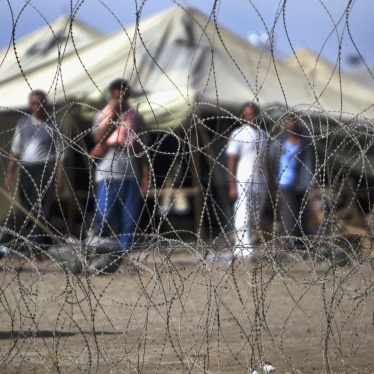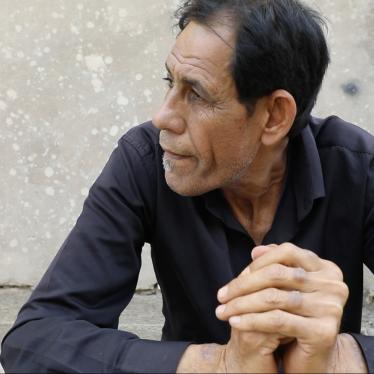Jennifer Daskal, advocacy director, US Program comments on the Military Commissions Act and the so-called alternative interrogation methods which remain illegal.
In signing the Military Commissions Act on October 17, President Bush boasted that Congress gave him exactly what he wanted: the ability to continue his secret prison program. But what the president neglected to mention is that so-called alternative interrogation methods, which were a primary reason he wanted the secret prisons in the first place, remain illegal.
A month ago, the President formally admitted what his administration had been denying for four years: that the CIA has been operating clandestine detention centers around the world where detainees are held incommunicado and subject to interrogation techniques he described euphemistically as “alternative” and “tough.”
But what the President calls “alternative” and “tough” is considered torture and inhuman treatment by most people – and by international law. Just this week, Vice President Cheney suggested that it is acceptable practice to subject detainees to what is known as waterboarding, which, despite its somewhat innocuous name, is a vicious form of mock drowning in which a prisoner is strapped to a board and suffocated by water. Earlier this year, more than 100 law professors wrote Attorney General Alberto Gonzales to say that waterboarding meets international legal definitions of torture.
The administration’s other “alternative” techniques reportedly include induced hypothermia and depriving detainees of sleep for so long they are physically sickened by fatigue. After World War II, U.S. military commissions successfully prosecuted as war criminals Japanese soldiers who subjected American prisoners to precisely these types of interrogation techniques.
So last year, when Congress passed the McCain amendment banning the use of “cruel, inhuman, or degrading” treatment by U.S. officials operating anywhere around the world, it put the CIA program in jeopardy. The administration tried to exempt the CIA from the prohibition, but failed. As a result, CIA agents fearful of criminal prosecution reportedly refused to continue such abusive interrogations.
Then, this summer, the Supreme Court further complicated matters for the administration by ruling that the humane treatment requirements of the Geneva Conventions applied to detainees captured in the fight against al-Qaeda. Anyone who ran afoul of these obligations could be prosecuted as a war criminal.
U.S. military intelligence officers had long been questioning the value of information derived from these abusive techniques. On the same day that the President conceded the existence of secret prisons, the senior intelligence officer in the U.S. Army, General Jeff Kimmons, told a Pentagon briefing: “No good intelligence is going to come from abusive practices. I think history tells us that. I think the empirical evidence of the last five years, hard years, tell us that.”
The U.S. Army’s new counter-insurgency manual states that “torture and cruel, inhumane, and degrading treatment is never a morally permissible option, even in situations where lives depend on gaining information.” It concludes that those who “lose moral legitimacy” by employing such methods “lose the war.”
The administration, however, was undeterred. While announcing that the secret prisons would be temporarily closed, it urged Congress to redefine U.S. obligations under the Geneva Conventions in a way that would allow the prisons to be reopened - and the abusive interrogations to continue.
Congress refused.
While the compromise legislation that ultimately emerged - the Military Commissions Act of 2006 - includes many deeply troubling provisions and endorses many administration proposals that undermine basic rights, it does not authorize abuse. To the contrary, it defines both torture and cruel and inhuman treatment as war crimes. Anyone who engages in – or authorizes – abusive interrogations is subject to prosecution as a war criminal.
Undoubtedly, the administration will try to find a way to torment detainees. If history is a predictor, it will attempt to twist the act’s language to allow abusive interrogations to continue. But CIA interrogators should be wary: the primary authors of the legislation, Republican Senators John Warner and John McCain have publicly stated that it was their intent to criminalize the abusive practices allegedly carried out by the CIA. And a plain reading of the law suggests that any judge would have little difficulty upholding a conviction for such abuses.
For now, the secret CIA prisons are closed and Congress has firmly stated that abuse and torture should not be part of the U.S. fight against terrorists. Let’s hope the prisons stay closed, and Congress retains its newfound sense of moral outrage.
Published in The Narragansett Times







